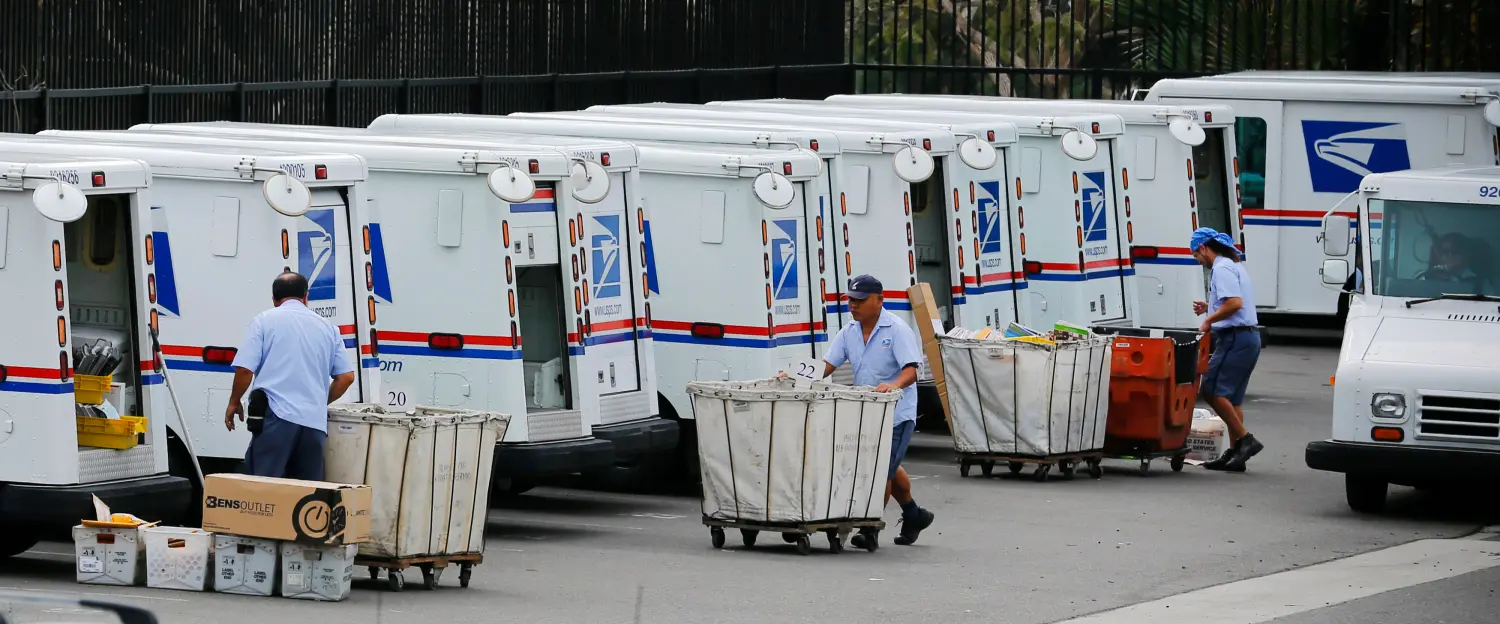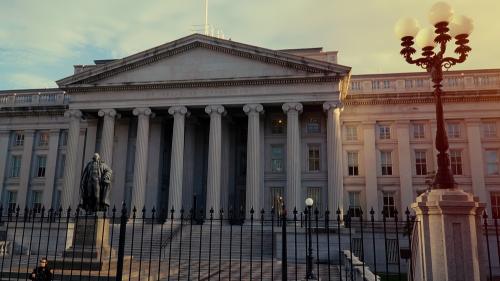This report is part of the Series on Financial Markets and Regulation and was produced by the Brookings Center on Regulation and Markets.
There’s an old joke that a banker is someone who lends you an umbrella when the sun is shining, but demands it back at the first sight of rain. We see this, too, in banks’ relationships to communities based on their socioeconomic status. In my neighborhood in the Philadelphia suburbs, there are financial institutions everywhere, of all kinds—global conglomerates, credit unions, community banks, and much else. Combining census data from 2010 and this useful tool from the National Community Reinvestment Coalition, my ZIP code has one physical bank branch for roughly every 1,500 people. But go south a few miles to northern Philadelphia, and that ratio changes to one bank branch per 8,000. Population density increases, poverty rates skyrocket, and banks’ brick-and-mortar investments make way for the much more expensive payday lenders and check-cashing services. It’s raining in Philadelphia, but banks seem to be in the business of selling umbrellas in the sunny suburbs.
Senator Kristen Gillibrand (D-NY) has recently introduced a legislative solution to this problem. Building on the innovative research of legal scholar Mehrsa Baradaran, Senator Gillibrand has brought new life to an old idea that would put the government back in the business of banking the poor through the postal system. That is, in addition to the other services that the United States Postal Service provides (USPS)—dealing primarily but not exclusively with mailing letters and packages—it would also provide traditional banking services for checking and savings accounts, credit intermediation (that is, providing loans), transactional services like ATMs and bill payments, and domestic and international wire transfers. Under this proposal, the USPS would become a major banking juggernaut.
Professor Baradaran and those who have followed her deserve enormous credit for steady efforts first to expose the problem of the un- and underbanked in the U.S. and now to rally policymakers around a specific proposal. But is it the right solution? Bankers certainly don’t think so. Rebeca Romero Rainey, the new CEO of the formidable Independent Community Bankers of America, wrote in The American Banker that postal banking, unlike fine wine, is “a bad idea” that does not “get better with age.” The proposal, she writes, “would put the livelihoods of many Americans in the hands of a government agency with zero experience in underwriting loans and that cannot even balance its own books while putting taxpayers at risk of further bailouts.”
It’s easy to dismiss the views of those who have the most to lose from this kind of legislative proposal, but there is something to the critique that this would be a new business for the modern USPS (despite the postal service’s experience in a dramatically different economic and financial context, as Professor Baradaran describes). But just because the government lacks experience with some policy or practice doesn’t mean it should not be undertaken. On that logic, the age of governmental experimentation ended before it began.
I am more troubled by three other aspects of postal banking that need to be resolved before determining that the solution is feasible and durable.
The least important problem is whether a bricks-and-mortar approach is the right one for the 21st century. Mobile banking is transforming the way that individuals of all socioeconomic and racial backgrounds interact with the financial system. Indeed, according to the Fed’s most recent survey on Consumers and Mobile Financial Services, “[h]igher shares of younger adults, Hispanics, and non-Hispanic blacks reported using mobile banking and mobile payments than the overall survey averages,” a trend that exists for smartphone usage as well. It seems that the barriers to participation from among racial minorities, at least, may not be physical; a brick-and-mortar approach might miss this rising demographic group.
This is the least important objection because there is nothing preventing the USPS from explicitly taking a mobile, fintech approach. If the problem were as simple as ditching bricks-and-mortar, then online-only banking options would’ve resolved this problem long ago. Internet banking is almost as old as the internet, but the private-market has still not solved the problems of financial access.
The second question is more troubling. Very soon after entering the banking business, a postal banker will face a low-income borrower in default. Default is an inevitable aspect of banking. Given the population in question—people with few resources, living paycheck-to-paycheck even in good times—default expectations will be much higher.
It is difficult to imagine politicians, citizens, and customers having the stomach to abide the collection on nonperforming loans when the collector is the government itself. Indeed, we have experience with this: The IRS flexes its significant might regularly, to garnish wages, enforce liens, and otherwise make its presence felt in the face of unpaid tax debts. The IRS is the second least popular agency of government (after the Veterans Administration) and a regular political punching bag while the U.S. Postal Service is the most popular agency, by a wide margin. Would the USPS be able to maintain that popularity when its ethos includes wage garnishment and repossession? Do we want the government in this business at all?
Perhaps this would be an improvement over the existing model. Or perhaps it would be a short-lived experiment precisely because of the political toxicity of these kinds of collection efforts. One can imagine a political campaign that puts Republicans and Democrats alike in the position of condemning unscrupulous postal bankers who are simply trying to do what bankers do: enforce interest rates and collect debts at a level that allows credit intermediation to continue. Given how much our public policy can be driven by exceptional narratives—think opposition to self-driving cars on the basis of a handful of crashes—postal banking, even if it succeeds, could become a political victim of its very economic success.
The last objection is the most serious one. Let’s be clear: Keeping interest rates low for populations that have a high risk of default is a governmental subsidy. Interest rates are not simply bankers extracting their pound of flesh from innocent borrowers. Interest rates reflect overall market conditions, profit margins, and (importantly) default risk. Regulation should ensure that unfair, deceptive, and abusive practices are not permitted. But high interest rates are not necessarily a sign that someone has been abused. It may be a sign that someone is at high risk of default.
If Senator Gillibrand’s vision to provide “low-fee and low-interest rate micro-loans” would extend credit at prices that default risk cannot justify, the government is on the hook for that difference. If that interest rate is priced below what the default risk would justify, then postal banking will quickly run out of money and require significant governmental support to remain viable.
A solution to some of the criticisms against postal banking would be to embrace the idea of increasing subsidies to those for whom the American economic miracle has been an economic calamity.
That subsidy is the point of this exercise, a feature not a bug. A solution to some of the criticisms against postal banking would be to embrace the idea of increasing subsidies to those for whom the American economic miracle has been an economic calamity. Better, though, to provide these subsidies in ways that puts decision-making in the hands of the people themselves. Those who would prefer to use that subsidy to cover financial services can do so. But those who would use that subsidy for child care, or housing, or food, or employment insurance, can take those paths as well. Postal banking doesn’t allow that flexibility.
As Professor Baradaran points out in her path-breaking book, How the Other Half Banks, it is very expensive to be poor. It is raining in Philadelphia, in Detroit, in Appalachia. But are bankers—private or governmental alike—the best people to provide umbrellas? Those who favor postal banking have not yet made that case.
The author did not receive any financial support from any firm or person for this article or from any firm or person with a financial or political interest in this article. He is currently not an officer, director, or board member of any organization with an interest in this article.
The Brookings Institution is committed to quality, independence, and impact.
We are supported by a diverse array of funders. In line with our values and policies, each Brookings publication represents the sole views of its author(s).







